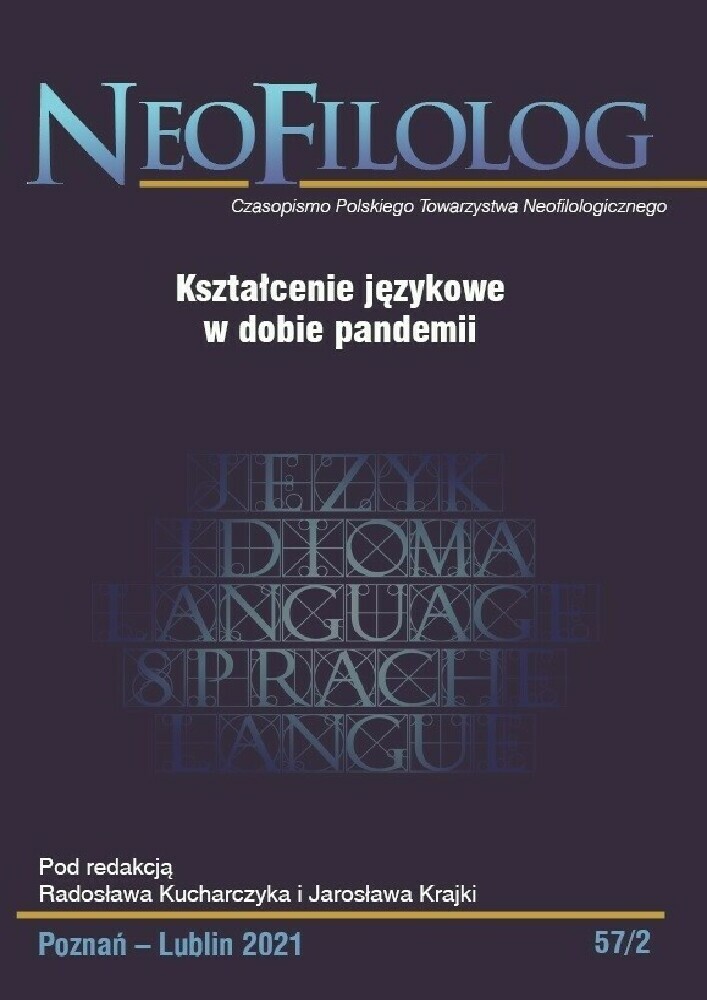Abstrakt
The 2020/2021 pandemic year has been difficult for teachers at all levels of education including higher education. There was a need to switch quickly to another type of education that would achieve the same objectives as before. How did the university teachers face this challenge? What consequences have been drawn for university teaching in general? We propose to take a global perspective of the state of current university pedagogy to highlight the need to renovate its approaches and to put the learner at the center of the process so to provide pedagogical support in his learning. We will analyze the results of three surveys concerning remote teaching and learning in Poland and in Europe. Finally, we will show what tools can be used to better monitor students` learning in virtual classes.
Bibliografia
Alava S., Langevin L. (2001), L’université, entre l’immobilisme et le renouveau. „Revue des sciences de l’éducation”, 27 (2), 243–256.
Bożykowski M., Izdebski A., Jasiński M., Konieczna-Sałamatin J. (2021), Raport : Nauczanie zdalne w czasie pandemii i perspektywa powrotu do normalności. Warszawa: Pracownia Ewaluacji Jakości Kształcenia Uniwersytetu Warszawskiego.
Boyer E. L. (1990), Scholarship Reconsidered: Priorities for the Professoriate. Princeton : The Carnegie Foundation for the Advancement of Teaching.
Buchner A., Wierzbicka M. (2020), Nauczanie zdalne w czasie, edycja II. Centrum Cyfrowe, https://centrumcyfrowe.pl/edukacja-zdalna/ [consulté le 2.05.2021].
Cotton K. (1988), Monitoring Student Learning in the Classroom, Online: https://educationnorthwest.org/sites/default/files/MonitoringStudentLearning.pdf [consulté le 27.04. 2021].
De Ketele J.M. (2010), La pédagogie universitaire : un courant en plein développement. „Revue française de pédagogie” Online : 172 | juillet-septembre 2010. http://journals.openedition.org/rfp/2168, [consulté le 27.04.2021].
Fulton J., (2019), How to guide and monitor student learning, Online: https://www.classcraft.com/blog/monitoring-student-learning/ [consulté le 15.04.2021]
Gérard L. (2013), Former les doctorants à la pédagogie, Online : https://www.researchgate.net/publication/260286999_Former_les_doctorants_a_la_pedagogie [consulté le 2.05.2021].
Kiffer, S. (2016), La construction des compétences d’enseignement des enseignants-chercheurs novices de l’université en France. Thèse de doctorat rédigée sous la direction de G. Tchibozo, Université de Strasbourg, Online : https://www.theses.fr/199421935 [consulté le 27.04.2021].
Lebrun M. (1999), Des technologies pour enseigner et apprendre. Bruxelles : De Boeck.
Lebrun M. (2005), eLearning pour enseigner et apprendre. Allier pédagogie et technologie. Paris : Academia-Bruylant.
Marchand L. (2001), L’apprentissage en ligne au Canada : frein ou innovation pédagogique? „Revue des sciences de l’éducation”, 27 (2), 403–419.
Postareff L., Lindblom-Ylänne S., Nevgi A. (2007), The effect of pedagogical training on teaching in higher education. “Teaching and Teacher Education”, 23, 557–571.
Pyżalski J. (dir.) (2020), Edukacja w czasach pandemii wirusa COVID-19. Z dystansem o tym, co robimy obecnie jako nauczyciele. Warszawa: EduAkcja.
Rege Colet N., Berthiaume D. (2009). Savoir ou être ? Savoirs et identités professionnels chez les enseignants universitaires, (dans:) Hofstetter R., Schneuwly B. (dir.), Savoirs en (trans) formation : au cœur des professions de l’enseignement et de la formation, 137–162.
Rege Colet N. et al. (2011), Le concept de Scholarship of Teaching and Learning. “Recherche et formation” Online : n° 67 « Former les iniversitaires en pédagogie », http://rechercheformation.revues.org/1412 [consultéle 27.04.2021].
Romainville M. (2000), L’échec dans l’université de masse. Paris: L’Harmattan.
https://www.ecml.at/Resources/Webinars/tabid/5456/Default.aspx [consulté le 27.04.2021].
Licencja
Prawa autorskie (c) 2021 Jolanta Sujecka-Zając

Utwór dostępny jest na licencji Creative Commons Uznanie autorstwa – Bez utworów zależnych 4.0 Międzynarodowe.
Przedstawiany utwór (artykuł) upubliczniany jest na podstawie umowy z autorem i na licencji Creative Commons Attribution-NoDerivatives 4.0 International (CC BY-ND 4.0).
Użytkownicy mają obowiązek podania wraz z rozpowszechnionym utworem, informacji o autorstwie, tytule, źródle (odnośniki do oryginalnego utworu, DOI) oraz samej licencji;
- bez tworzenia utworów zależnych,
- utwór musi być zachowany w oryginalnej postaci.
Uniwersytet im. Adama Mickiewicza w Poznaniu zachowuje prawo do czasopisma jako całości (układ, forma graficzna, tytuł, projekt okładki, logo itp.).

